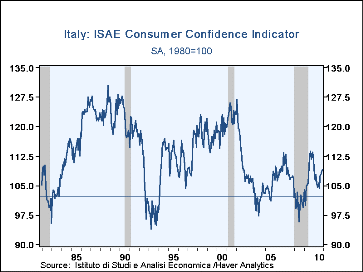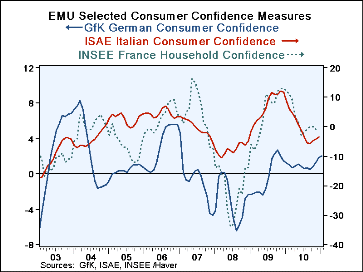 Global| Dec 23 2010
Global| Dec 23 2010Italian Economy: Challenged...Italian Spirit: Indomitable
Summary
The Euro-Area is beset with challenges all around. Italy's name comes into the mix of countries that could be hit by debt problems after Portugal and Spain and sometimes Belgium. It's like a market-based hit list in some 'B' movie... [...]
The Euro-Area is beset with challenges all around. Italy's name comes into the mix of countries that could be hit by debt problems after Portugal and Spain and sometimes Belgium. It's like a market-based hit list in some 'B' movie... or is it more like Joe McCarthy's list of Communists in America that turned out to have no basis in reality and to be his real life laundry list? Is this just froth being turned up with no real substance?
Is Italy as troubled as the pundits say?
One argument against the pessimists is from Italians themselves. For all the recent troubles in the Zone, the US renewing its swap arrangements in Europe, and Italian PM Silvio Berlusconi's surviving a 'no confidence vote,' Italians continue to feel better.
How can these people FEEL BETTER in the midst of all this chaos?
I suppose the first point to make is to ask what they feel 'better than?' And that is part of the story...
In the second chart we see that Italian confidence has been less variable than confidence in Germany and France. While this chart is not suited for a formal inspection of this concept you can see that the Italian line has less erratic up and down movements than the others for France and Germany. To make this point formally, I evaluated consumer confidence using the same EU Consumer confidence measures in the Haver Analytics database rather than using the national barometers in the chart above. With the EU Commission indicators you get the same methodology across countries. Among a group of countries including Germany, France, the UK, and Spain, Italy has the least variable consumer confidence statistically. German confidence has a variation that is 4% above the average for this group; Spain's variability is 20% above the average; while Italy is 15% below the average. We conclude that Italians are sort of naturally nonplused by events.
Even so it's not like Italian confidence is in great shape relative to its own history. The Italian Consumer confidence index from ISAE in the table and in the first chart is only in the 44th percentile of its high-low range and stands in the 47th percentile of queue of ranked values, both since 1993. These are not sterling standings.
Indeed using the EU Commission data, we find despite much greater volatility in Germany, it has the highest consumer confidence in the last 20 years. Italy with less volatility ranks in the 82nd percentile on the EU measure along with the UK. It is France that is lagging, in the 48th percentile compared to Spain in the 80th percentile. So we are faced with several metrics about volatility as well as the level of confidence when making evaluations. On balance Italy is doing better than we might expect given the circumstances but the Germany with more erratic confidence movements is clearly in a superior economic state.
Still, the fact of the situation is the European outsiders seem more concerned about Europe than do Europeans. I don't think it is because the Europeans are less interested or have less at stake, far from it! Perhaps Europeans have a greater sense of the ties that do bind them together. Too much of the angst about Europe is being done based on the numbers. The numbers are grim. But if Europe really has a political will to stick it out, it can make bad numbers 'work'.
Raise your eyebrows about the debt in Ireland, for example. Ireland undertook an unbearable load of debt onto its national balance sheet off the books of its banks, to save its banking system. Ireland's clearly was a political decision. Is Ireland alone in making political decisions like that about economic events? If the rest of Europe would shoulder the same sort of burden - and here I think specifically of Germany- then maybe it is the outsiders that are overestimating risk and mis-estimating the real glue behind the Euro-system, not just the euro-system.
All of this is speculative. But in thinking such thoughts I assume that there is an underlying logic to what is going on. Economists assume logic and look for the event that would cause people or nations to act in a way that is seemingly-irrational. Surely, whatever its reason, Ireland knew what it was doing. Ireland's treasury can run numbers. Italy can see this, too. The domino theory is not new. We saw it in operation in Latin America; we saw developing economics succumb in the Asian debt crisis on a similar theme. But sometimes the dominos are not lined up right and one falls, failing to strike the next and short-circuiting the whole process.
But maybe markets are getting carried away with themselves too. Maybe there is just too much capital around willing to make big speculative bets and to take big risks and not enough to take moderate risks and loan money to the guy who is upside down in his mortgage, just down the street from the bank.
Surely there is some disconnect about how much money is available to bet against sovereign borrowers that are getting help and banding together while making sacrifices, and how little capital wants to flow in to help economies rebuild. Surely...
At the end of the day maybe can see that the Italians know something about the way the world works that makes them less full angst about what markets are doing. Maybe it's too simple to say that Italians believe in 'mean reversion', but markets do not stay at their extremes and have been known to overreact. Keeping calm can have its rewards. Ignoring warning signals, however, can make things worse. So for Italy, which is it?
| Italy ISAE Consumer Confidence | |||||||
|---|---|---|---|---|---|---|---|
| Since 1992 | Rank | ||||||
| Nov-10 | Oct-10 | Sep-10 | Aug-10 | Percentile | Rank | Percentile | |
| Consumer Confidence | 108.5 | 107.8 | 107.3 | 104.2 | 44.2 | 111 | 47.9% |
| Last 12 Months | |||||||
| Overall Situation | -68 | -69 | -66 | -58 | 63.2 | 107 | 49.8% |
| Price Trends | -43 | -44.5 | -42.5 | -36 | 9.7 | 207 | 2.8% |
| Next 12months | |||||||
| Overall Situation | -34 | -33 | -33 | -19 | 7.9 | 205 | 3.8% |
| Price Trends | 17 | 20 | 18.5 | 19 | 39.5 | 45 | 78.9% |
| Unemployment | 16 | 16 | 11 | 16 | 62.7 | 13 | 93.9% |
| Household Budget | 4 | 1 | 1 | 0 | 27.5 | 177 | 16.9% |
| House Fin Situation | |||||||
| Last 12 months | -32 | -34 | -30 | -35 | 49.0 | 73 | 65.7% |
| Next12 months | -8 | -8 | -3 | -8 | 51.1 | 158 | 25.8% |
| Household Savings | |||||||
| Current | 60 | 51 | 51 | 58 | 66.7 | 23 | 89.2% |
| Future | -26 | -28 | -22 | -27 | 51.2 | 144 | 32.4% |
| Major Purchases | |||||||
| Current | -39 | -34 | -36 | -48 | 51.0 | 88 | 58.7% |
| Total number of months: 213 | Back to Mar-93 | ||||||
Robert Brusca
AuthorMore in Author Profile »Robert A. Brusca is Chief Economist of Fact and Opinion Economics, a consulting firm he founded in Manhattan. He has been an economist on Wall Street for over 25 years. He has visited central banking and large institutional clients in over 30 countries in his career as an economist. Mr. Brusca was a Divisional Research Chief at the Federal Reserve Bank of NY (Chief of the International Financial markets Division), a Fed Watcher at Irving Trust and Chief Economist at Nikko Securities International. He is widely quoted and appears in various media. Mr. Brusca holds an MA and Ph.D. in economics from Michigan State University and a BA in Economics from the University of Michigan. His research pursues his strong interests in non aligned policy economics as well as international economics. FAO Economics’ research targets investors to assist them in making better investment decisions in stocks, bonds and in a variety of international assets. The company does not manage money and has no conflicts in giving economic advice.
More Economy in Brief
 Global| Feb 05 2026
Global| Feb 05 2026Charts of the Week: Balanced Policy, Resilient Data and AI Narratives
by:Andrew Cates








